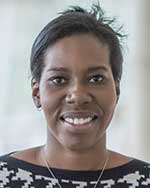University Assistant Professor Recalls Career Development Opportunities at Moffitt
Dr. Leah Cook started at Moffitt in January 2012 as a postdoctoral trainee in Dr. Conor Lynch's lab. During her time at Moffitt, Leah was heavily involved in the Postdoctoral Association. She had a hand in the creation of some of the career development sessions and helped to establish the Office of Postdoctoral Affairs. She also worked with the department of Government Relations where she met with state representatives and politicians to boost their support for biomedical research funding. Because of her work with the Postdoc Association and Government Relations, she was able to show a good amount of service on her CV which was helpful in landing her faculty position.
 Currently, Leah is an Assistant Professor at the University of Nebraska Medical Center where she is investigating the contribution of neutrophils to prostate cancer growth in bone. Some notable findings were recently published (Costanza et al. Neutrophils are Mediators of Metastatic Prostate Cancer Progression in Bone, Cancer Immunology Immunotherapy Feb. 2020) where Leah and her teammates found that neutrophils in bone elicit a cytotoxic immune response that comes dampened and eliminated as tumor cells progress in the bone.
Currently, Leah is an Assistant Professor at the University of Nebraska Medical Center where she is investigating the contribution of neutrophils to prostate cancer growth in bone. Some notable findings were recently published (Costanza et al. Neutrophils are Mediators of Metastatic Prostate Cancer Progression in Bone, Cancer Immunology Immunotherapy Feb. 2020) where Leah and her teammates found that neutrophils in bone elicit a cytotoxic immune response that comes dampened and eliminated as tumor cells progress in the bone.
Leah noted that her mentor, Dr. Lynch, gave her the flexibility to pursue her own research and was instrumental in helping with her grant writing - which she mentions not many postdocs get the opportunity to write. By the time she applied for her current position, she had already submitted two grant applications for her own research and was able to turn that into her projected plan for her lab at the University of Nebraska.
When asked what she enjoys about her current position at the University of Nebraska and what challenges her the most, Leah said she truly enjoys getting to direct her own research and mentor scientists, "it’s fun to see people that work for me get excited about the science and come up with their own ideas; that’s a really inspiring part of the job to witness." The most challenging part of her position was transitioning from only having a handful of things to manage as a postdoc, to being the main person that everyone depends on to fix stuff as a PI. "Decisions about purchasing a reagent, hiring people and trying to figure out who’s the best fit for the lab, or if equipment breaks down how and when to get it fixed, whose experiments are affected by it. It’s a lot to manage and it can be stressful."
Lastly, we asked Leah if she had any words of advice for the trainees here at Moffitt. She said, "I would tell all the trainees to not get discouraged. In science we don’t really celebrate each other – the culture is very harsh, nothing is good enough, do more, find more, etc. Being on this side, I see that there’s always your own very special niche or mindset that you bring to the table and we don’t talk about that enough. If you have an idea for your own research, don’t get discouraged just go for it, keep at it because even the senior leaders deal with some of the same stresses. Also, for the ones who don’t think they want to do academics that’s okay because there are a whole plethora of other science-related jobs if you don’t want to leave science. Be encouraged about science, stay in there, we need people who are willing to put in the work and get themselves heard on the science side of research, whether it be science advocacy, science policy or even in industry."
Where Are They Now
- Office of Postdoctoral Affairs
- Office of Graduate Affairs
- Office of Undergraduate and Visiting Scholar Affairs
- What We Provide
- Contact Us
- Diversity in Training and Education
- About Tampa Bay
-
News
- PhD Student Julia Billington Selected to Deliver Oral presentation at AACR Conference 2024
- Team Members Share Experiences at National Postdoctoral Association Conference 2024
- Grad Student Appreciation Week 2024
- Dr. Ranjita Poudel Selected as a mHealth Scholar for Hybrid 2024 mHealth Training Institute
- Moffitt Postdoctoral Association News Recap
- State College of Florida Students Visit Moffitt Labs
- PhD Student Olabisi Osunmakinde Wins 2024 Graduate Research Symposium Presentation at USF
- PhD Student Mostafa Nasr Receives AACR Scholar-in-Training Award
- Welcome New Postdoctoral Fellow, Dr. Olivia Rose
- Moffitt Hosts Tampa Bay Chamber Collegiate Leadership Program
- Moffitt Researchers participate in the Great American Teach-In
- Dr. MacLean Hall, 2023 Outstanding Thesis and Dissertation Award
- 2024 PhD Student Visit
- 2023 Junior Scientist Research Partnership Awards
- Moffitt Innovators of Tomorrow Symposium Welcomes Its First Recruited Postdoc, Dr. Hayley du Bois
- Tumor Busters Raise Money for Miles for Moffitt
- Dr. Paulo Rodriguez Awarded W. Jackson Pledger Researcher of the Year
- RET Halloween Party and Pumpkin Carving Contest
- Ted Couch Lecture Welcomes Dr. William Kaelin
- Student Receives NCI Predoctoral to Postdoctoral Fellow Transition Award
- 2023 Junior Scientist Retreat
- 2023 Annual Student Welcome Reception
- 2023 Cancer PhD Outstanding Research Award Recipients
- 2023 Moffitt Scientific Symposium Recap
- Moffit and Saint Leo University Partner at Event
- Where Are They Now
